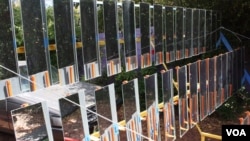Solar power technology could help to reduce deaths caused by household pollution.
Pollution trapped inside homes and other buildings kills more than 4 million people each year. Most of these deaths are in the developing world, mainly in Africa.
Many people die as a result of breathing smoke or from cooking over wood- or coal-powered stoves.
One way to reduce the number of deaths is through cooking equipment powered by the sun.
Crosby Menzies is a solar power expert with SunFire Solutions, a South African company. He described his latest solar cooker, called the ‘Sol-4.’
“It is four square meters of mirrors, six to eight meters in length. It is quite a large cooker. We are very pleased to have built the first one in South Africa.”
Solar cookers work by reflecting light from the sun off large mirrors. The mirrors direct the light at a cooking pan. Then the light heats the pan with solar energy.
At SunFire’s office in Johannesburg, reflected sunlight heated up a cooking pan. Within two minutes, the pan was hot enough to cook sausages and onions.
Crosby Menzies said the solar cooker can boil water in just four minutes. That is as fast as cooking with natural gas or electricity.
He said the cooker is also much “friendlier” than other models because people do not have to stand in the sun to use it. The Sol-4 lets users cook in partial sunlight as long as the mirrors are positioned in the sun.
Menzies said SunFire has sold hundreds of the solar cookers in South Africa. He said the company is exploring new projects in Mali, Ethiopia and Uganda.
He added that many people do not believe that solar cookers will work until they see the cooking results with their own eyes.
“The technology really is viable. A lot of people still do not know that it works, and we are working as hard as we can to change that.”
Menzies noted that people can prepare meals without having to collect firewood or spend money on coal. Such individuals would be less likely to develop breathing disorders from harmful smoke.
Since the Sol-4 is so large, it is not the kind of model that you want to move around too often. It is best set up in a permanent place where large groups gather, like a school or home for older adults.
At present, the cooker only works when the sun is shining. But engineers are working on a way to make it work without sunlight.
Each cooker costs about $2,000, which is a large amount of money for most Africans.
To solve that problem, Crosby Menzies has created a non-governmental organization called Solar Cookers for Africa. It plans to raise money through donations to provide poor people with solar cooking equipment.
Menzies also is partnering with a Finnish company to give free help to communities wanting to build their own solar cookers.
I’m Bryan Lynn.
Darren Taylor reported on this story for VOANews.com. Bryan Lynn adapted his report for Learning English. George Grow was the editor.
We want to hear from you. Write to us in the comments, and post on our Facebook page, thank you!
_____________________________________________________________
Words in This Story
solar – adj. relating to or determined by the sun
reflect – v. to throw something (light, heat, sound, etc.) back from a surface
mirror – n. a piece of glass that reflects images
stove – n. a piece of cooking equipment; a device that burns fuel for cooking or heating
boil – v. to become so hot that bubbles form in a liquid and rise to the top





